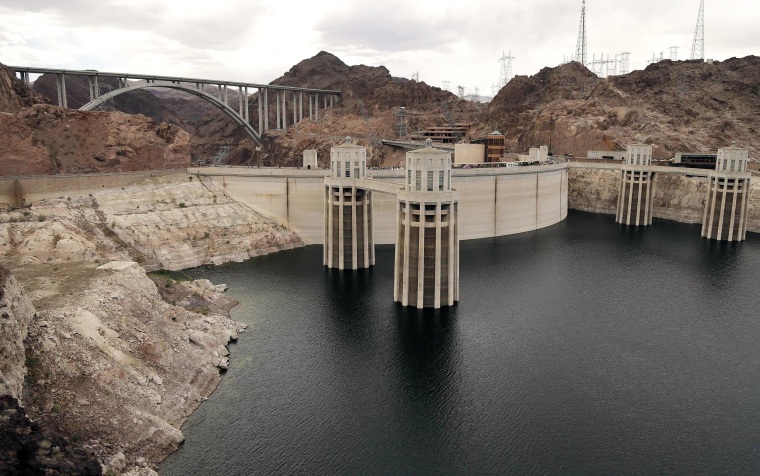Marijuana growers operating legally in Colorado and Washington state took another hit from the federal government on Tuesday when the U.S. Bureau of Reclamation announced that pot growers are (still) not allowed to use federal irrigation waters.
Since 1902, the bureau has been charged with maintaining dams, power plants and canals in the 17 "western states" — from North Dakota, Nebraska and Texas to Washington, Oregon and California.
As such, the agency also provides irrigation for millions of acres of agriculture in Washington and Colorado, the two states that recently made recreational marijuana legal for adults.
But the bureau wants weed growers to know that, at least at the federal level, the times they aren't a-changing.
So, on Tuesday it reclarified a law that has been in place for decades.
"As a federal agency, Reclamation is obligated to adhere to federal law in the conduct of its responsibilities to the American people," Dan DuBray, chief of public affairs, said in a statement to NBC News.
The bureau says it had been fielding questions from all points west on the use of water in pot operations.
On Tuesday, in what's called a "temporary policy" decision, the bureau reiterated that federal law still rules.
"Reclamation will operate its facilities and administer its water-related contracts in a manner that is consistent with the Controlled Substances Act of 1970, as amended. This includes locations where state law has decriminalized or authorized the cultivation of marijuana. Reclamation will refer any inconsistent uses of federal resources of which it becomes aware to the Department of Justice and coordinate with the proper enforcement authorities," it said.
"Pretty soon it's going to be air. They're going to say you can't use the air because it belongs to the federal government."
That last line means that the bureau won't actually be enforcing the law so much as letting the Justice Department know when it believes marijuana growers are using federal water. It's also the responsibility of local bureaus and state offices to regulate who gets approved to use federal irrigation.
The decision is termed "temporary" because a permanent policy decision would require a lengthy process that includes public hearings.
According to the bureau, it delivers water to about 1.2 million acres of irrigated land each in Colorado and Washington.

Still, it remained unclear what sort of penalties legal weed growers who used federal irrigation waters would face.
In a statement to NBC News, Justice Department spokeswoman Ellen Canale said, "The Department of Justice will continue to enforce the Controlled Substances Act and will focus federal resources on the most significant threats to our communities. Our efforts will be guided by the eight factors set forth in the August 29, 2013 guidance memorandum."
Those eight factors (PDF) are: preventing the distribution of marijuana to minors; preventing its revenue from going to criminal enterprises; preventing diversion to states where it is illegal; preventing state-authorized marijuana activity from being used as a cover for other illegal drug activity; preventing violence and the use of firearms in the cultivation of marijuana; preventing drugged driving and other adverse public health consequences; preventing growing of marijuana on public lands; and preventing marijuana possession or use on federal property.
Meanwhile, many in the burgeoning legal marijuana industry saw Tuesday's announcement as more of the same in terms of federal harassment for something that is sanctioned at the local level.
"It looks like another case of public officials acting against the better interests of themselves and their constituency due to a lack of critical thinking," Naomi McCulloch with Green Lion Farms in Seattle, and a member of the Association of Cannabis Breeders and Growers, told NBC News.
But she believed her fellow growers would find solutions to be completely independent of federal water.
"The general feeling is that there are ways to get water, if one source closes, another will open. It takes a lot of fortitude and planning to be a farmer, of any crop. If the government throwing up obstacles to our success stopped us, we wouldn't have made it this far," McCulloch said.
"We're used to this kind of treatment, the federal government looking for one obstacle after another to place hurdles before this industry," Elan Nelson, business consultant for Medicine Man dispensary in Denver, told The Associated Press. "We'll just have to find a way to deal with it and move on."
Since California legalized medical marijuana in 1996, 19 states have followed its lead, and last year Colorado and Washington became the first to allow recreational use of the drug.
But federal authorities from the DEA to the FBI to the IRS have often targeted those businesses who set up shop legally under state laws. And banks, universities and other institutions subject to federal oversight have shunned the legalized pot industry.
"Pretty soon it's going to be air," Nelson said. "They're going to say you can't use the air because it belongs to the federal government. It's just ridiculous."